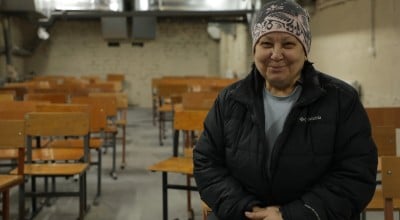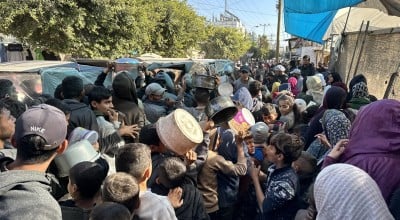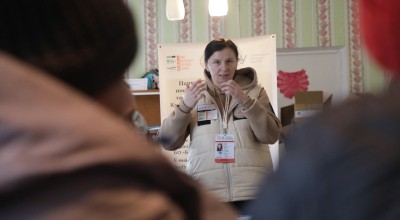
Read our 2024 annual report

Knowledge Hub
Spotlight on women in leadership: An interview with our Country Director in Türkiye
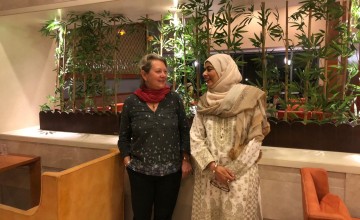
Last November, our UK Executive Director, Danny Harvey, visited the Concern Türkiye programme, seeing first-hand the amazing protection, livelihoods and education work they are doing with Syrian refugees.
Faryal Minhas is the Country Director and, although new to the Türkiye team and Concern, has confident but quiet authority as she goes about the leading the team. This interview really gives an insight into the challenges and motivations for women at the forefront of international development and humanitarian efforts.
What made you want to work in international development?
I was born and brought up in Yemen, a country with very kind but extremely poor people. Then, I moved to the UK when I was 20. It was a different lifestyle, I felt people were more self-centred and their focus was on their own issues.
I started my work in development with special needs children and then moved to work with ethnic minorities.
There was so much said and done but in my early career, this did not make sense to me for some reason. I felt my work was more to show something is being done rather than actually focusing on the change and impact.
I then returned to Yemen and started a role with Oxfam. That is when I could see the role of development and the changes such interventions bring to the lives of those in need.
Policy developments and high-level negotiations never made sense to me. But what I enjoyed is being in the field, helping people directly, listening to them and their needs, involving them in the planning and change-making process, and seeing the impact.
Sometimes it is not only about the developmental interventions, but emergency response and small support like food baskets and cash support make a huge difference.
Raising awareness amongst communities on rights and seeing the impact on their lives is such a satisfactory and life-changing feeling on a daily basis. I call that feeling my fuel to keep on going and doing more.
Can you tell us what your job looks like day to day?
I have a lot of meetings, mostly online (since Covid-19) and some face-to-face. to see to a lot of planning, looking for funding sources, dealing with staff issues and complaints, and field visits.
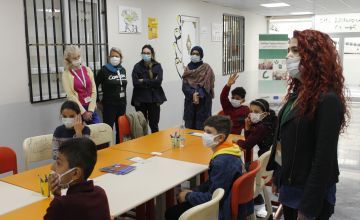
As a woman in your sector, what is one of the key challenges you’ve faced and how have you overcome it? Did you face specific challenges getting to where you are today, and if so what were they?
It is not only about the sector but being a woman has its own challenges. There is a lot of talk about women’s rights but at times you feel that it is hard to change perceptions that people are brought up with. People may verbally agree to various rights but there are very few who actually believe in them. Most people, not only men but women, especially in the culture I come from, see the role of a woman to be a traditional housewife. Recently there is more awareness and discussion on gender roles and integration but this was not the case over twenty years ago when I joined the sector.
First of all, people believe that women cannot give as much to work as men because they have families and children. Periods, pregnancies, childbirth and looking after children can impact work especially when field work and late evenings are required. Therefore, they are reluctant to hire women in key roles. Most of my early work was emergency response, which did not have a pattern and required immense travel to the field to very remote areas. I overcame this by ensuring that I was there when my work needed me.
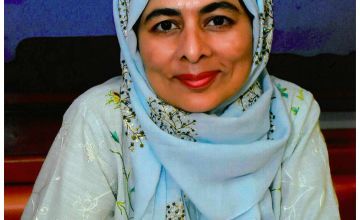
The second issue was that I was generally a soft person. I was once told a long time ago that I was good at my work but I could never be a successful manager because I was too kind. My answer was: what is seen as a weakness is my strength to bring people together. I will work with my kindness and be successful as I do not believe in arrogant or rude behaviours.
In some organisations, it felt like a woman of my background may not be able to fit in with the management due to the percentage of men and women in such roles, the uneasiness of having discussions, and at times not being able to join the peer group in out of work activities and meetings. In some cultures where men are the main speakers, a woman speaking up was not appreciated.
My job was my need to support my family. I had worked during pregnancies and emotional turmoil. I have been on the front line to respond. I was able to do it as the nature of my job became a passion for me and gave me a lot of satisfaction seeing the change in others' life. At times, I felt I ignored my own children when preaching child protection and rights to others. With my hard work and commitment, my work was recognised by the organisations I worked for. With time, my views were respected and I was given the chance to develop and lead. I never wanted to be a woman in a management role because I was a woman, but I wanted to be a woman in a key role because I could do it because of my persistence, experience and hard work.
How do you think being a woman influences your work, if at all? Do you think women bring certain skills to specific jobs?
I am here or in my previous roles because of the skill sets and qualities required by a leader. But I believe being a woman, gives me the ability to support my team better and understand their needs better. Perhaps it is the sensitive nature of women. In my job, I have felt that it was easy for my team and my colleagues to reach out to me and discuss any concerns they may have. I can represent and take up matters related to female staff and to those that affect the families of male staff. Having a woman leader makes other women feel more comfortable to be in the organisation and grow with it to eventually take on senior roles.
What would you say to a girl or young woman wanting to become leaders?
Becoming a good leader will come with time and experience. You need to work hard, believe in what you do and why you do it. Make your place with hard work, be persistent and speak up when you see a gap but do it in a way that your actions make you a role model. Do not jeopardise the place of other women who will and can walk into leadership roles tomorrow.
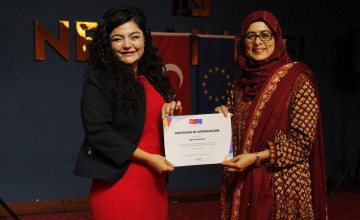
Is there a woman you’ve met along your journey whose story has stayed with you and motivated you?
I met many women who have been an inspiration and huge support during my journey. First of all my own mother, who worked very hard after the death of my father to support us. One of my managers, Rajni Khanna, who saw the potential in me when I did not realise it, continues to be an inspiration even today through her kind words. Some young girls whom I came across in my work had the resilience and passion to be something despite the traumas they had faced. If I look at history, then the story of Queen Arwa always fascinated me. Over a thousand years ago, she ruled the Arab world for a very long time and left a legacy behind. A thousand years later, we are starting the discussion on women’s rights!!
What do you enjoy most about your job?
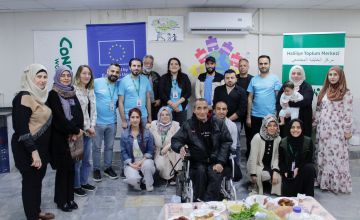
The change that my work brings in the lives of those we work with and reaching those most in need. Doing our job with passion and excellence. Most of all, I feel lucky to be in a job where I can support my family and at the same time support the change process in the lives of those who need it.
Thank you so much Faryal!
Other ways to help
Corporate support
Is your company interested in working together for a common cause?
Fundraise for Concern
From mountain trekking to marathon running, cake sales to table quizzes, there are lots of ways you can support our work.
Buy a gift
With an extensive range of alternative gifts, we have something to suit everybody.
Leave a gift in your will
Leave the world a better place with a life-changing legacy.
Volunteer with Concern
The lots of ways to get involved with our work as a volunteer
School fundraising
Without the generous support from schools, we wouldn't be able to do the work that we do.


